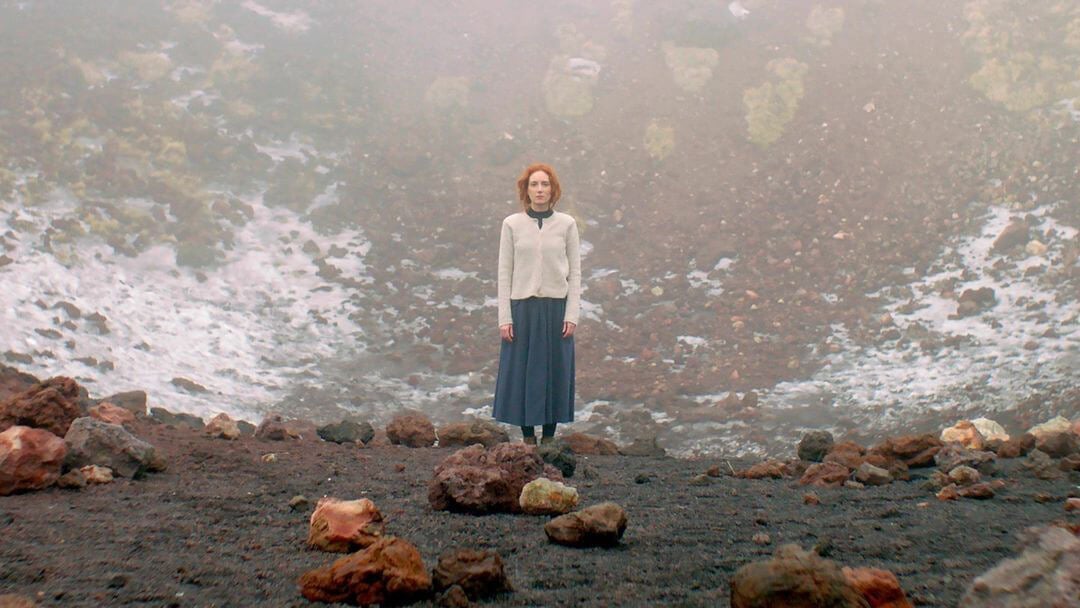Maria D. Rapicavoli ends her 20-minute The Other on a note of exhaustion: “The story keeps on getting written.” The film’s subtitle describes the film as a familiar story, and it is, indeed. The compelling style, however, renders it unforgettable. The story of the Sicilian protagonist is specific to post-war Italy and yet effortlessly resonates across groups and ethnicities. There is something truly chilling when the narrator states that neither the (first-person) story nor the voice narrating it belongs to her. And that they could, because it has been of many. This is a story of cumulative memory.
The film establishes an impression of displacement through repeated shots of water while the protagonist (Lucia Cammalleri) recounts, with no specificity, the forced journey she undertook with her husband upon being married. Her married life, one of control, includes specifications not only on finances, but also on diet. Her family, including the husband, is represented only by mannequins. Food is merely constituent ingredients. A farce on all ends, on whose maintenance depends her everyday peace and safety. The film juxtaposes quarreling dogs with the wreckage of war while the voiceover dwells on gender conflict. Between dogs there is a base of equality; between bombs and buildings, only one is constructed with the power and intent to destroy.
Drone shots allow the camera to move with a nauseating fluidity as the protagonist runs through a garden. What should evoke vivacity, only brings to mind desperation. A three-minute sequence documents her imagination, one of the few means of subversion available to her. In it, she removes the bed from the bedroom so that when her husband suggests she go to bed with him, she may not have to submit to her husband in yet another way, yet again. Sisyphus like, she keeps rolling the startlingly blue bedframe—at odds with the peeling and fading surroundings—out with the singular tenacity of the housewife. The difficulty of the incline is replaced by the inherent reluctance of a rectangle to roll. So she toils, on and on. When the bed is successfully negotiated with, the space around her replaces it as her new challenge. The claustrophobia from the tight framing worsens for the sound design as wood knocks against unyielding wood in a passage that barely accommodates one person.
The film asks an essential question, “What is a woman?” One immediately thinks of Simone de Beauvoir who deliberated the same. It is a condition of passivity, says the film. A passivity forged in cruelty, inculcated with the repeated mantra, “Be women, stay women, become women.” Her economic dependence, an essential condition for passivity, is portrayed not through its enforcement, but through its subversion. The scraping sound of each coin—earned through underpaid labour at the factory—that she painstakingly hides away is a tense pointer to the threat of discovery, a careful, minute step away from passivity.
By pointedly not writing others characters with human actors, leaving the protagonist so unquestionably plural and vague, and eschewing a conventional narrative form, the film forcefully underlines its exhaustion with the history that forms its basis. Like Hannah Gadsby’s act of letting the comic form fall apart in Nanette, Rapicavoli determinedly undoes futile narrative attempts to appeal to society’s morality. In a post-Roe v. Wade world, the futility weighs all the more heavily.
A film that develops its concept through multiple threads, as much through its technical craft as it does through its ubiquitous no one and everyone heroine, The Other is a cerebral work that dwells on the history of femininity as one of displacement, fear, rehearsal and necessary subversion. In The Other, Rapicavoli posits the enforced object as the subject, and what’s more, reminds the audience, this has been done over and over. This has been demolished just as often.
Watch The Other Short Film
The Other: A Powerful Work on the Conditions of Historical Womanhood
-
Direction
-
Cinematography
-
Screenplay
-
Editing
-
Music
